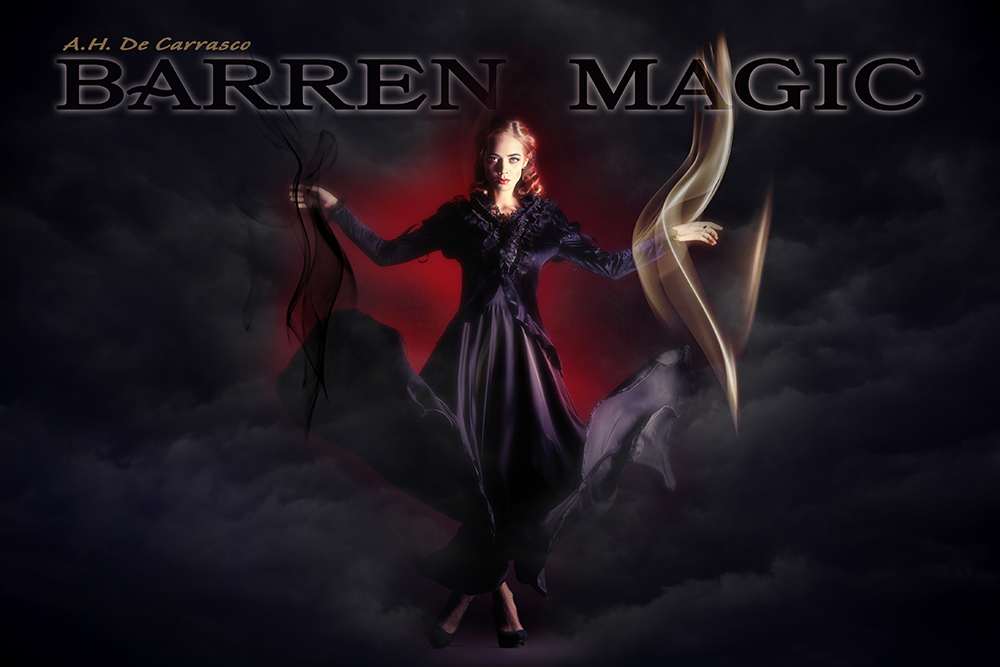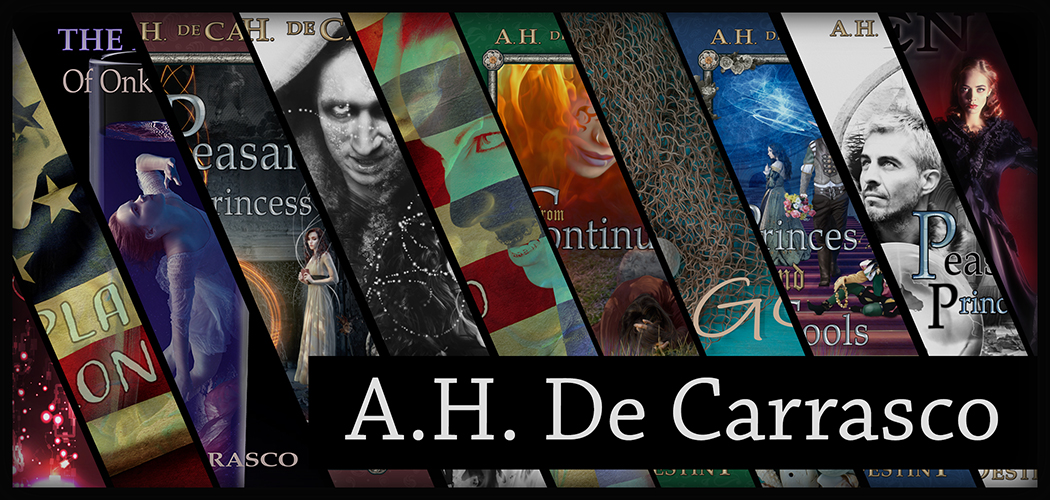or Grace and the Deepest Despair

He was a magician of thin wrist, thick charm, and nimble fingers, who traced the five elemental symbols in the air before a breath left his lips, like a feather kiss, an incantation that manifested creation, and upon his knee, a translucent bird of foreboding appeared, a ghost of threads cawing at the village elders to either open their purses or revisit old curses. She was a dancer of slender ankles and light foot, whom he spotted in the low courtyard beside the black gape of the village well, while ladies bickered from the stones below with their thick chins shuddering to their chests as cavernous mouths opened to let their thicker tongues wag, lamenting how so much cleavage could not distract from scarcity of grace. But the magician stopped midcount of his profits as he watched her dance upon the sand as if walking upon blood. Below, at her sole and toe, was magic—her soul’s radiance—the wildness of which he had never seen before, lighting the sand as if daylight was born beneath her toes.
He pulled her into his tent and taught her what he knew of bodies and clinging and rapture so fleeting. She blew upon his skin, and the sin of it lasted through daylight, suspended until shadows descended twice more. He was a man of numbers and inflections, she a woman of Earth’s core and wanton intensity. He taught her beats and measure—how pleasure could yield a greater spell if arsis was switched with thesis, and she stole all the men’s hearts at the neighboring oasis, the magician and she buying a horse and donkey, for their reward fit not in pockets and pouches but chests and cases.
By day they were saviors of new cities—at night they saved each other, cauterizing old wounds with the heat of their lips and the words he taught her and the motions she showed him until in the heat of the desert, the magician professed his love and proved his intention by revealing the greatest of his spells—the Riddle of Fractions. But the Riddle of Fractions is always followed by the Riddle of Shadows and the dancer, embracing a sorceress’s trial, fell into the Shadow, the Beyond Oblivion, the Abyss of the Infinite in that small space until she was sifting sand through her fingers while desert devils spun around her—devouring her clothes until she held the appearance known by both pious beggar and mad crone.
She emerged ten days later from the storm of the desert and the storm of the mind, her clothes shreds, her face raw, and her hair streaked with silver. She staggered to the waters but stumbled and fell a hand’s breadth from the spring. The magician walked to her cautiously, noting her many changes. He touched her with the toe of his boot, and the woman curled into a ball, shielding her head with her arms and whimpering for him not to look upon her so.
The magician had thought her stronger. He sucked his teeth, silently lamenting at what she had become, aged and suspicious, a stranger auspicious. A danger.
He took a knife from his saddle and cut the skin of her soles from her feet, ignoring her cries, while hoping that some stable magic might yet reside in the calloused skin. He left with horse and donkey, but the danceless followed behind, agony as her sandals, confusion her robe, the hot sand cauterizing her wounds as she traced his path, before the wind took all trace of him.
At the first village, he crossed the thresholds of both tanner and seamstress. At the second, he sought out the cobbler and a merchant with sunset ribbons of rose and magenta. And these the danceless observed, crouching beside village wells and under palm trees as the children of the square stopped their prancing to press dates and figs to her palm, the fruit falling through her fingers to land beside her knees, her eyes following the magician’s path, her eyelids stinging, her feet bleeding, her heart hollowing.
He confronted her outside the third village and told her to go about her life alone, shaking the dust from his sandals, shooing her away with his hands and with his scorn, and finally with his fists.
She stalked behind, a cautious distance then, in his shadow, unwilling to leave the darkness of his cruelty for the light of her lonely path. And so fleeing solitude led her to the threshold of his courtyard, where she saw him greet his wife and his home and tickle the chin of his infant son. He presented his wife with slippers made of the dancer’s skin, and they shared a moment beside the fire swaying like swans, together, engulfed in a silent song only they knew.
The danceless languished by the village well, until the women clucked in sympathy for it lightened the heart with purpose to find a woman sobbing rather than one dancing in the clouds, And they pulled bone combs through her knotted tresses and lent her a dress of crimson and a veil of midnight blue.
He came to the well once, staying clear of her, but offering a sneer to her before going on his way, warning her not to follow for a fellow had one shadow, which was enough.
She stayed. She stared hard into the night sky, then gazed down into the deep well, where the brittle stars also lived, and she threw a stone there to break the mirror and watch the liquid swell and distort and smooth back into stillness. She thought of fractions, of chips and tiny divisions that cut apart what seems whole, that dissect and inspect, that break down and spread but remain as if static while perspective makes the motion. The tiny become the sky filled with stars and the stars become infinity in both grand and minuscule measure. And the joke, immeasurable. The hope of soft laughter hovered within her core as she traveled inward and found her space and arose by choice, to stand in her life and accept the farce of living within the shattered, that plosion suspended without ripple or echo.
Just before dawn, the sorceress crept to the home the magician kept. She counted each footstep as an ironic fragment, an illusion within a limitless life. She stole his purse from the hearth, eyeing the chests beside the mantel, which were as much hers as they were his. She opened one, divided its contents of gold and silver, the metal cold against her fingers, and stuffed that into the purse until the sack was bulging at its seams. Then she grabbed the slippers made from her flesh and placed them upon her feet.
She was halfway to the door when something rustled behind her, and she turned lightly on her toes to see the magician’s wife standing in front of the hearth, her face drawn, her eyes bleary from sleep. Her voice was soft as she asked what the sorceress might need at such an hour and held a kindness that curled the sorceress’s fingers into fists, one digit at a time. The sorceress looked toward the door as her heart blackened and her feet, pinched by their own tanned skin, slipped into a dance of fleeting grace and tripping and stumbling. The sorceress danced about the magician’s wife, bragging of the secret she and the magician shared, until the wife’s voice turned hard and brittle as she demanded the dancer give up the secret—the right and riches that were surely hers and not for some haggard rustic with grizzled hair.
The Riddle of Fractions is nothing new, only ignored. It isn’t a secret, really. So there the sorceress, yielding to her demands, sat and told the wife the Riddle of Fractions. The sorceress waited as the shadows enfolded the magician’s home before she crept back to her place by the well as bitterness melted into worry and worry to guilt and guilt to fear and fear to despair.
The magician returned five days later to a wife sifting through the ashes of the hearth. And he found his son dead and forgotten in his small bone crib.
He strode to the well, a tornado, a demon, an heirless soul. The sorceress beheld his threatening form, forgot her guilt, and sneered at his absurdity—clinging to things that did not truly exist—and he struck her twice across the cheek before tearing his clothes from his body and shrieking out a new spell, the most powerful, born of his anger and shame.
Then came the clouds that swirled around his torso with such force that his flesh fell free as ashes from his bones and his blood fell like a rain of tar upon the sorceress and burned her like acid until she was but pain and salt. And their pain became a whole lot of nothing and everything, blossoming into a rose of countless petals that grew to consume the desert village and beyond. And any traveler who ventured near it was drawn inside without a moment to protest—into the small and infinite, a hole so black as to grant both grace and the deepest despair.
*****
Author Note: I have chosen to use present tense for some instances of universal truths known in this fantasy world. That’s on me. A sincere thank you to Hot Tree Editing for proofing this story. I’d also like to thank Gevalia for their amazing coffee. –Ann
copyright 2019 by A. H. De Carrasco. All rights reserved.
stock images from Depositphotos




